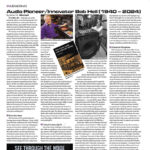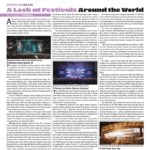This could be Richard Fernandez’s list of clients, or your favorite playlist on your iPod: The Cars; Crosby, Stills, & Nash; Bob Dylan; Eagles; Faces; Tom Petty & The Heartbreakers; Boz Scaggs; Neil Young; Frank Zappa; and more.
It’s likely both.

Fernandez, who surely had one of the most enviable careers in the live production business, will receive this industry’s highest honor, the Parnelli Lifetime Achievement Award on Oct. 22 at the Rio Hotel in Las Vegas. This tour manager has survived and thrived since the earliest days of what is today is very much a business, competently and calmly ferrying musicians to their gigs no matter what state they were in or what exactly they did to their hotel room with a chainsaw. And he’s the first to admit Life’s Been Good to [him] So Far: “I’ve been fortunate, because I artistically respect most of the bands I’ve worked with,” he says.
“When musicians are out on ‘the proud highway,’ we need all the help we can get,” says Graham Nash. “The secret is a good tour manager. For decades, Richard has been that lifesaver. I am pleased to have been taken care of by such a professional. Congratulations to him, because this award is well deserved.”
AEG executive VP Larry Vallon shares a high school alma mater with Fernandez, and the two started their careers at the same time and place. “What has sustained him and made for a long and successful career are his intelligence and his demeanor,” says Vallon. “Nothing rattles him.” And based on his good reputation, “artists and managers call, hoping he’ll say ‘Yes’ to going out on the road with them. He’s always in demand.”
“Richard was the unanimous choice of the Parnelli Board of Advisers,” says advisory board chairman Marshall Bissett. “From Faces to Tom Petty, he has brought class, style and humor to the impossible task of keeping band, management and crew in harmony. We know of no one more loved by his clients or respected by his peers.”
“I could never thank you guys enough — I am humbled and joyous,” said Fernandez on receiving the news.

East L.A. Beginnings
Born on the east side of I-5 in Los Angeles, Fernandez came from a happy, supportive, music-filled home. “My dad was a huge music fan and always had jazz playing, along with some Mexican music in the house,” he says. “I remember him telling me stories about coming back after World War II and hanging out in New York for an extra two weeks just to hit the jazz clubs — seeing Art Tatum, and people like that.” Dad took his five-year-old son to his first concert — Duke Ellington performing at East L.A. Community College. “I didn’t really understand what was going on,” he laughs. “I do remember it being loud, overpowering and everyone had a good time.”
As a teenager, Fernandez got into surfing, with one of the accessories being a station wagon. This vehicle naturally attracted friends who had bands and needed help getting their equipment to gigs. In high school, Fernandez met Vallon, and the two would become lifelong friends. Vallon, the son of a diplomat, grew up moving around Central and South America, and when he finally landed at Montebello High School, the newcomer was grateful to meet the perpetually friendly Fernandez. (Vallon also befriended Fernandez’s brother Charlie, who also got into the business and has been a longtime tour manager for Jimmy Buffett.)
Fernandez attended that community college where he heard Ellington, but didn’t really know what he wanted to focus on, career-wise. Drafted in 1967, he was based in Greece for two years. “His career in the military was the perfect training for what he would become. He spent time as the guy who had a briefcase of top secret papers handcuffed to his wrist and was sent all over the world. By the time he was done with the service, he knew a lot about airports, locations and logistics,” Vallon laughs.
When Fernandez returned home, he went back to helping bands with their equipment and doing various day jobs, like working on the railroad. Hanging out in Long Beach one day, he met drummer Phil Jones, who was then playing for the band Crabby Appleton, who had a couple of minor hits at the time.
“He was setting up my drums in those days,” Jones recalls. “Then I worked with him later when I was working with Tom Petty. From the very beginning, he was always calm and efficient in the face of multiple tasks and constantly putting out fires without causing stress to the band and crew.”
Fernandez found himself squarely in the eye of the hurricane that was the Southern California music scene, hanging out at the Whisky on Sunset Boulevard and driving gear up and down the California coast and beyond.
Meanwhile, Vallon returned from a stint in Vietnam and took up his old gig as a page at ABC Television working with Bob Eubanks on shows including The Dating Game, The Newlywed Game and The Lawrence Welk Show. “Many forget that Eubanks was a [broadcast radio] DJ too, and then he got into concert production, having brought the Beatles to the Hollywood Bowl twice.” Eubanks formed Concert Associates with 24-year-olds Steve Wolf and Jim Rissmiller. Besides a secretary, their first hire was Vallon. When another hand was needed, Vallon reached out to his high school buddy Fernandez.
In describing just one event, Vallon says: “In those days, the Grateful Dead would put their gear on a local airline, and we had Richard rent a U-Haul and go fish it out of the terminal, and then bring it to the Santa Monica Civic Center and set it up.” During this incubation period of the industry, there were no titles. Everyone did everything, from hauling and setting up gear to stage-managing and emceeing.
Fernandez was always hustling for related gigs, and got himself into Studio Instrumental Rentals (SIR) in L.A., where he made many important connections. He did a little work for guitarist Johnny Winter, working under his road manager Teddy Slatus and manager Steve Paul, and their professionalism impressed him.
Then Fernandez got a career-changing phone call from Vallon. The year was 1971, and Faces needed some help for their show at the L.A. Forum. “I went down there, just happy to help them unload, but their management told me they needed me to get the band on the plane and make sure they got to the next gig,” he laughs. For the next three weeks, he was, for the first time, a “tour manager,” and he succeeded at the task, ending up at a last show in New York City. He was ready to return to L.A., but management wanted him to stick around, and soon he was off to Europe, working with Faces.
“To be quite honest, so much of it was first because of Phil Jones, and getting in with the right kind of like-minded people,” Fernandez says. “Handling mics, driving a truck, taking a piano somewhere — whatever needed to be done, I took care of it.” During this career gestation, his father was another key advisor. “He was the one guy I always bounced ideas off,” Fernandez explains. “He and my mom were so supportive of us kids. I was happy they lived long enough to see I could make a successful living at this, and they ended up living at my house on
Capistrano Beach.”
London Calling
“[Road manager] Pete Buckland took me under his wing and was so generous with his time and making sure I was comfortable,” Fernandez says, of his early days in London. “This was the early 1970s, and there were not many Americans there at the time, let alone Mexicans!”
But going to England was the best thing he could have done for his career. “It was like boot camp for road managers.” Fernandez’ professional yet easy-going style helped him forge strong relationships with everyone in the Faces organization. “To this day, when I see Rod [Stewart] somewhere, he is always warm and cordial.” He laughs and recalls when managing Faces from the hotel to gig in 1971, he once arrived with them only to discover he had forgotten keyboardist Ian McLagan. Luckily, Fernandez got a pass on that one, and it was an error he never repeated.
In 1972, Faces were recording a new album with famed producer Glyn Johns, who was also working with a new American band. Johns was so impressed with Fernandez that he told him to call manager/agent John Hartmann immediately about a gig. Fernandez did, but at first demurred about the offer, because he was finishing up a tour with Faces. “That’s okay,” Hartmann told him. “You can catch up with them.” The band was The Eagles, and after a few weeks of their first tour, Fernandez did indeed catch up with them, and then worked nonstop with them as they catapulted to fame. He rode that crazy train until 1977, right past their Hotel California release, which became one of the best selling albums of all time. Along the way, the band’s success coincided with increased tension among its members and, of course, chainsaw-inflicted hotel rooms. “It was a challenging time,” he grins. “I left right before it all got even worse, as I could see where it was all headed.”
Also during this period, Fernandez met and did some work with Crosby, Stills, Nash & Young. “We were all working out of Elliot Roberts and David’s Geffen’s office at Lookout Management.” In the mid-80s, he worked with Young separately on several tours, and went out with Crosby, Stills & Nash in the late-1990s and again in the late-2000s.

Free Fallin’
No one can blame Fernandez for wanting to get off the road after that experience. Not sure what he wanted to do, he chilled and also did some management in an office for a while. During this period he was spending time with Chicago’s manager James Guercio and the band’s tour manager Jack Goudy. “I knew them for a long time, and we were talking about the changes in the business happening, the emerging technology, and ways we could all do our jobs better,” Fernandez recalls. But his friends noticed that he was missing the road. Over dinner, Goudy told him, “You gotta get yourself a band!” Short stints with Frank Zappa and Dave Mason were followed by a call from old friend and former Faces (and Rolling Stones) guitarist Ronnie Wood, who wanted him to take his side project, The New Barbarians, out on their seminal tour in 1979.

During this period, he first saw Tom Petty & The Heartbreakers — albeit via satellite feed. “I thought, ‘Damn these guys are good — they are taking rock in a new direction.’” When the Barbarians were playing the L.A. Forum, via Vallon, he reached out to Petty and invited him and Petty’s manager, Tony Dimitriades, down to the show. “I walked Tom into the dressing room and introduced him to the band, and then, after the show, went to dinner with Tony.” Fernandez expressed interest in working with Petty and company, but Dimitriades said flat out he couldn’t afford Fernandez. But Fernandez could sense the future of this band. There was an exceeding low dollar put on the table, to which Fernandez replied, “Raise it $50, and never tell anyone I did this tour for this amount.” Of course, the caveat was, there would be a bigger payday when the band got more successful. (It was always “when” for Fernandez, not “if”). Some 37 years later, Fernandez is still working for them. This year, he joined Petty’s original group, Mudcrutch.
In 1986, while working Farm Aid, Fernandez met Bob Dylan and started doing various tours with him, which for years synched perfectly with Petty’s tours, keeping him busy and never in conflict. That lasted until 1992, when Fernandez returned to primarily working for Petty and the band. Yet, he also somehow squeezed in working with Ric Ocasek and The Cars in the late 1980s, and most recently during their 2008 outing.
“When I first met Richard, we didn’t even know what a tour manager was!” says Ocasek. “At first, I just thought he was a good guy to have around, but after a while I started noticing how really well everything was taken care of. There was chaos, but he was always calm and cool. Of all the crews I ever worked with, he’s really the only one I remember. I’d wish him luck, but he doesn’t need it. He does deserve this award, though.”

The Fernandez Approach to Success
Fernandez credits keeping current with technology and being able to organize good old-fashioned spreadsheets (paper and digital) as key to staying on top of it all. He starts a tour working with management, looking out for problems, focusing on challenges as soon as he spots them. “I’ll notice a date and say, ‘We can do that, but we’re going to need an extra $200,000 in a charter plane to make it work.’ Then they’ll be like, ‘Oh no!,’” he laughs. It’s a lot of budgeting and chasing the dollar with the accountants in the beginning stages, but then Fernandez is a happy wanderer.

While Fernandez was tempted to cross over and become a manager at different points, he realized he likes where he is. “I really like my down time,” he says, noting that his friends who are managers are working all the time, including when the band is in the studio. Always keeping his personal priorities straight, he elected to move to Hawaii in 1977 even though that might seem like a risk for his career. He made that locale work on many levels, including meeting Terry Sullivan, a woman who ran a small grocery store. They married in 1992, and Fernandez helped her raise her two children, Lila and Alex. “I’ve had a great life!” Also, his love of jazz never wavered, and when he’s not on the road, he is host of the “Sunset Jazz” show for Hawaii’s Kauai Community Radio — KKCR. But he has no intention of stopping his day gig: On Petty’s recommendation, he recently went out with Jeff Lynne and his ELO tour.
Reflecting on the touring scene after working it for over 40 years, Fernandez notes that it’s gotten better on many different levels. The days of a band getting on stage three hours late are long gone, and the level of professionalism associated with live music is high. But even during the crazy early days, he always made sure the band got to the gig on time. He laughs and recalls when he was running with Faces, Bill Graham was impressed that Fernandez got the band on stage on time. “I told him, ‘Hey these guys are pros — I mean, they may be drunk, but they are also pros!’”
One thing that never changed is Fernandez’ demeanor. “Rather than letting the situation absorb you, you should absorb the situation. I got that from my dad. Like working at the Whisky in the early days — there were a lot of people getting drunk, smoking pot, doing acid and having a good time. Once you walked in, it was easy to be absorbed by it all, but I didn’t let that happen. I was more interested in what was coming out of those black boxes on the stage!”
Richard Fernandez will receive the Parnelli Lifetime Achievement Award at this year’s gala on Oct. 22 at the Rio Hotel in Las Vegas. For reservations and more information, visit www.parnelliawards.com.



